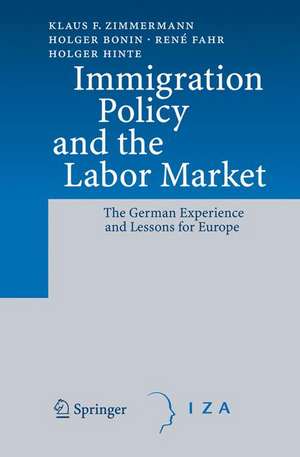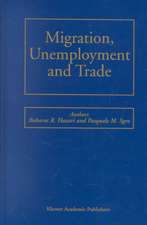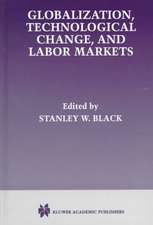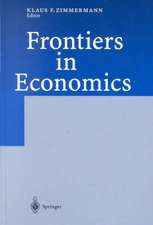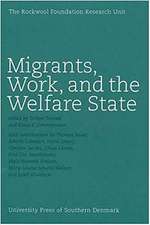Immigration Policy and the Labor Market: The German Experience and Lessons for Europe
Autor Klaus F. Zimmermann, Holger Bonin, René Fahr, Holger Hinteen Limba Engleză Hardback – 14 feb 2007
| Toate formatele și edițiile | Preț | Express |
|---|---|---|
| Paperback (1) | 636.63 lei 6-8 săpt. | |
| Springer Berlin, Heidelberg – 14 oct 2010 | 636.63 lei 6-8 săpt. | |
| Hardback (1) | 642.83 lei 6-8 săpt. | |
| Springer Berlin, Heidelberg – 14 feb 2007 | 642.83 lei 6-8 săpt. |
Preț: 642.83 lei
Preț vechi: 756.27 lei
-15% Nou
Puncte Express: 964
Preț estimativ în valută:
123.01€ • 126.90$ • 102.65£
123.01€ • 126.90$ • 102.65£
Carte tipărită la comandă
Livrare economică 27 martie-10 aprilie
Preluare comenzi: 021 569.72.76
Specificații
ISBN-13: 9783540683810
ISBN-10: 354068381X
Pagini: 220
Ilustrații: VIII, 209 p.
Dimensiuni: 155 x 235 x 18 mm
Greutate: 0.49 kg
Ediția:2007
Editura: Springer Berlin, Heidelberg
Colecția Springer
Locul publicării:Berlin, Heidelberg, Germany
ISBN-10: 354068381X
Pagini: 220
Ilustrații: VIII, 209 p.
Dimensiuni: 155 x 235 x 18 mm
Greutate: 0.49 kg
Ediția:2007
Editura: Springer Berlin, Heidelberg
Colecția Springer
Locul publicării:Berlin, Heidelberg, Germany
Public țintă
ResearchCuprins
Introduction: Why Do Germany and the EU Need a New Immigration Strategy?.- The Migration Issue in Germany.- The Economic Impact of Immigration.- Labor Shortages.- Managing Immigration: Policy Options.- A Proposal for an Economic Migration Management System.- Conclusions: Future Needs of German and EU Immigration Policy.
Textul de pe ultima copertă
German and European immigration policies have only recently begun to cope with the inevitable: growing labor demand in the face of high unemployment and a shrinking labor force due to demographic change. Despite the implementation of Germany's first immigration act and several European initiatives towards legal harmonization at the EU level, an actively controlling immigration policy, which would be needed to master the challenges ahead, is not yet in sight. Against this background, the book draws conclusions from the German history of immigration policy. It analyzes the country's future demand for immigration and develops an economic model for the effective selection and integration of labor migrants that could provide the foundation for a joint European immigration strategy.
"Western Europe, and in particular Germany, have come to realize that they are regions of substantial net immigration. This book develops prospects for future trends in German and European immigration policies. It is an essential input into any serious public policy discussion of European immigration issues."
Barry Chiswick, University of Illinois at Chicago, leading US immigration expert
"Legal migration should be managed rather than endured. To show policy makers and citizens under which circumstances legal migration can be beneficial, research is needed and puzzles need to be solved. Which criteria should be applied? What can we learn from traditional migration countries? What role is there for Europe? This book is a valuable contribution to these pertinent questions."
Marcel Canoy, Bureau of European Policy Advisers, Directorate General of the European Commission
"Western Europe, and in particular Germany, have come to realize that they are regions of substantial net immigration. This book develops prospects for future trends in German and European immigration policies. It is an essential input into any serious public policy discussion of European immigration issues."
Barry Chiswick, University of Illinois at Chicago, leading US immigration expert
"Legal migration should be managed rather than endured. To show policy makers and citizens under which circumstances legal migration can be beneficial, research is needed and puzzles need to be solved. Which criteria should be applied? What can we learn from traditional migration countries? What role is there for Europe? This book is a valuable contribution to these pertinent questions."
Marcel Canoy, Bureau of European Policy Advisers, Directorate General of the European Commission
Caracteristici
The book gives a history of German immigration policy and develops an economic model for the effective selection and integration of labor immigrants. Includes supplementary material: sn.pub/extras
